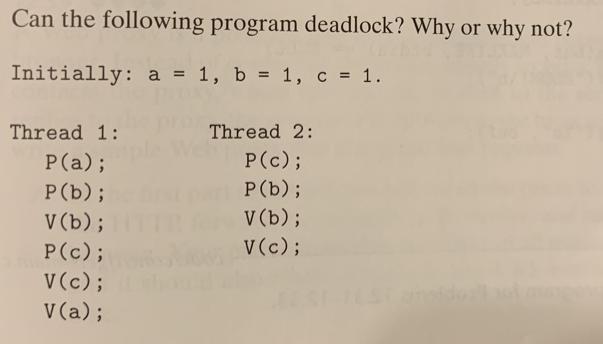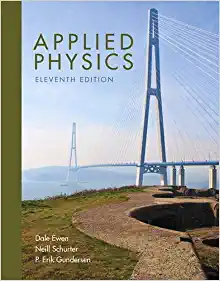Question
Can the following program deadlock? Why or why not? Initially: a = 1, b = 1, c = 1. Thread 1: P(a); P (b);

Can the following program deadlock? Why or why not? Initially: a = 1, b = 1, c = 1. Thread 1: P(a); P (b); V (b); P(c); V(c); V (a); Thread 2: P(c); P (b); V (b); V(c);
Step by Step Solution
There are 3 Steps involved in it
Step: 1
Here Pa is a kind of wait function Which reduce the value of Semaphore variable Va is kind of ...
Get Instant Access to Expert-Tailored Solutions
See step-by-step solutions with expert insights and AI powered tools for academic success
Step: 2

Step: 3

Ace Your Homework with AI
Get the answers you need in no time with our AI-driven, step-by-step assistance
Get StartedRecommended Textbook for
Applied Physics
Authors: Dale Ewen, Neill Schurter, Erik Gundersen
11th Edition
9780134159386
Students also viewed these Computer Network questions
Question
Answered: 1 week ago
Question
Answered: 1 week ago
Question
Answered: 1 week ago
Question
Answered: 1 week ago
Question
Answered: 1 week ago
Question
Answered: 1 week ago
Question
Answered: 1 week ago
Question
Answered: 1 week ago
Question
Answered: 1 week ago
Question
Answered: 1 week ago
Question
Answered: 1 week ago
Question
Answered: 1 week ago
Question
Answered: 1 week ago
Question
Answered: 1 week ago
Question
Answered: 1 week ago
Question
Answered: 1 week ago
Question
Answered: 1 week ago
Question
Answered: 1 week ago
Question
Answered: 1 week ago
Question
Answered: 1 week ago
Question
Answered: 1 week ago
Question
Answered: 1 week ago
Question
Answered: 1 week ago
View Answer in SolutionInn App



